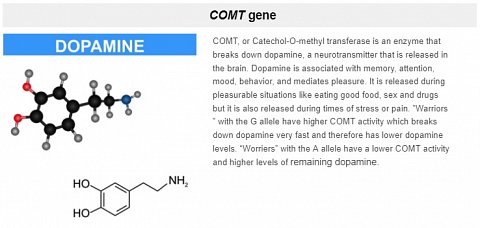-
Warrior vs Worrier
review on May 2, 2018
by Rebecca Fishwick

At a Glance
Summary
Overall, I found Kiragen’s ‘Warrior vs Worrier’ test to be a fun experiment. Not much is currently known about the influence of genetics on personality, and so I was keen to learn about one of the traits that genetic testing can reveal a predisposition for. While I wouldn’t take the results as absolute truth, it was interesting to discover how my genetics might affect my personality.
Full Review
Kiragen is a genomics applications company based in San Diego, California, and partnered with the DNA marketplace provider MyGenomeBox.
The company aims to help the global community understand and make use of their genetic information in order to achieve optimized health and happiness. By providing knowledge about preventative health and wellness issues, they hope to motivate people to improve their fitness and well-being.
Product Expectations
In order to access Kiragen’s web apps, I had to go to MyGenomeBox, a DNA marketplace website along similar lines to the Apple or Android store.
Unlike some DNA marketplaces, I was able to browse the store without logging in. However, in order to upload my data or purchase a web app, I would first have to create an account.
Looking through the MyGenomeBox website, it seemed they had a whole plethora of web apps, which they had divided into five categories: “Exercise/Diet”, “Personality”, “Ancestry”, “Trait” and “Health”.
I decided to look through the “Personality” apps they had to offer, and came across three different web apps by Kiragen: ‘Comprehensive Personality’ test, ‘Socio-Emotional Sensitivity’, and ‘Warrior vs Worrier’. I was able to see previews of the reports each app would generate. While all three seemed pretty interesting, I thought the Warrior vs Worrier test seemed the most detailed, and so opted to try that one.
Ordering Experience
Creating an account with MyGenomeBox was simple enough. I had to enter my name and email address, and I could also input optional information like gender and birth date. I saw I could connect directly with my 23andMe account (though for whatever reason, I kept getting an error message when I tried this), or log in with Facebook. Since I didn’t particularly feel like sharing my genomic data with Facebook, I decided to simply create an account.
In order to register, I had to agree with the Privacy Policy, Refund Policy and Terms of Service.
Looking through their Privacy Policy, I saw that they would collect any information I provided to surveys, forms, features or applications, such as my gender, date of birth or blood type. They also promised to secure my DNA data “beyond the healthcare industry standards”. I also saw that unless I set my browser to reject cookies, they would use cookies to log information about my browsing habits. They would also share my genetic information with their partners and sub-contractors, and would disclose it to the authorities if necessary to comply with the law.
The refund policy was rather harder to read, as the English was not very good. However, I gathered that I could request a refund if there was a transaction error, and could request refunds for purchases made using “purchased points”, credit cards and PayPal.
The Terms of Service were very brief, and stated that by agreeing to the Terms, I would accept responsibility for keeping my password confidential, and that the company would not be liable for any security compromise caused by my leaking the password or account details.
As soon as I created my account, I was sent a verification email, and had to confirm my email address before I could do anything else.
Data Upload
Next, I uploaded my genetic data. I saw I was able to upload from Gene2me, DragonGeneBox, 23andMe, AncestryDNA, FamilyTreeDNA or a VCF file. I had my 23andMe data saved, and so I uploaded it to their cloud.
This was all very straightforward, and the upload took barely a couple of minutes. I was told that my file had been verified, and could be used for the services provided by their apps. I also received an email telling me the upload was complete.
Since I was now able to purchase apps, I went ahead and added ‘Warrior vs Worrier’ to my cart. I was asked whether I agreed to share my genetic information with the app, and was informed that my purchase would be automatically refunded if an error occurred, or if my genetic data did not contain the information necessary to create a report.
As the web app I’d selected was free, the checkout was quick and easy, and I wasn’t prompted to give any payment details. I was told I would be able to view my results when they had processed – this seemed to be pretty much immediate.
The Results
In order to view my results, I located ‘Warrior vs Worrier’ in the “My Apps” section of “My Page”. Clicking on it, I saw they were contained in what was essentially a .PDF file.
Results Section: Overview
The “Overview” detailed the differences between the Warrior and Worrier personality types, and the upsides and downsides of each.

Warrior vs. Worrier.
I read that Warriors were more empathetic and altruistic, more likely to seek thrills, and had higher emotional resilience.
On the downside, they were more likely to engage in high risk behaviors, gain less pleasure from pleasurable experiences, and had worse fine motor skills. I also read that this genotype had a higher risk of developing schizophrenia, and that Warriors with bad childhood experiences might display antisocial and aggressive behaviors.
For the Worriers, the upsides were that they gained twice as much pleasure from pleasurable experiences as Warriors, that they were more creative, had a better memory, and better attention and strategising skills. Worriers also had improved cognitive function in low-stress environments, better reading comprehension, a higher response to placebo, and – interestingly – had better absorption of tea polyphenols (which can help to protect against cancer).
The downsides to being a Worrier (mostly implied in the name!), included a tendency for increased anxiety and feelings of insecurity, and a higher likelihood of developing Obsessive Compulsive Disorder (OCD), panic disorder, and Attention Deficit Hyperactivity Disorder (ADHD). Worriers were worse at handling stress, which could cause their stability and performance to decrease. Worriers were also less extroverted, empathetic and altruistic. They were less impulsive, had a lower pain tolerance, and were likely to avoid activities that could cause injury.
Results Section: My Result
The next page showed me my result. I found I had both copies of the “G” allele: the “Warrior” variant. I was told that I had a better resilience to stress and a higher pain threshold, though this was coupled with a “modest reduction in executively cognitive performance”. I took this to be a polite (though rather awkwardly worded!) way of saying that I was not genetically predisposed to be as intelligent as someone with the “Worrier” genotype.
Still, I saw they noted that behavioral traits are not determined by only one gene, and that lifestyle and environmental factors have a far larger influence on personality. They estimated that genetic factors influence traits by about 20-30%, meaning that 70-80% of any given personality trait is down to environmental and lifestyle factors.
There was also a little table detailing the Warrior/Worrier gene (COMT), the genotype I have, and some information about my genotype (shown below).

A table detailing my genotype.
Again, they listed the good and bad points of the Warrior genotype.
Results Section: A Little Advice
On the next page, I saw that Kiragen had offered me some advice regarding managing my genotyped behavior, titled “What you can do to decrease your risk”.
The first point of advice was that I should try taking amphetamines. I’m not kidding. Though they did add that I should speak with a doctor first, and that this wasn’t intended as medical advice. Apparently, amphetamines would help to increase my lacking dopamine levels.
I was also recommended to drink tea with a “a lot of EGCG content”, such as green tea, since this is a COMT inhibitor. Following the information from the table on the last page, I assumed this meant it would stop my COMT enzyme from breaking down dopamine too quickly.
It also told me to avoid cannabis use, especially during adolescence, since carriers of the Warrior gene “have 11 times increased risk of schizophrenia and psychotic symptoms with frequent cannabis use during adolescence”.
They recommended that if I have any children, I should give them as much parental warmth as possible, since they will inherit at least one copy of the Warrior allele (since I have two copies of it, this is guaranteed for any offspring of mine). I read that children with the Warrior genotype are more likely to display aggressive or antisocial behaviors if they have a stressful childhood.
They also told me to “observe [my] thoughts and question them often”. Since I’m not predisposed to be as thoughtful as Worriers, I should take care to evaluate my thought process, and control my responses in certain situations.
Lastly, I was told I should choose activities and a career suited to my risk-taking nature, and take time to evaluate my peers, since high risk behavior is often reinforced through peer-pressure.
Results Section: Representative Genes
The next page had some information about the COMT transferase: an enzyme that breaks down dopamine (shown below).

Information about the COMT transferase enzyme.
I read that dopamine is a neurotransmitter released in the brain, which is associated with memory, attention, and mood – and also with mediating pleasure. Since I’m a Warrior, my COMT enzyme activity is higher than that of a Worrier, and so my dopamine levels decrease more quickly.
Below this was a “Myths and Facts” section. The “Myths and Facts” listed included: “Worriers get more pleasure out of life but also more misery”, that people with the G allele (the Warrior allele) donated twice as much money than those without it, and that there are more East Asians with the Warrior allele than Europeans.
Of course, the most striking thing about the “Myths and Fact” section was that there was nothing to say whether any of these things were myths or facts.
At the bottom of the page was a “Sources” section, where I found a list of research papers they’d referenced.
My results ended with a disclaimer, saying that they were not clinically validated, and that the sort of DNA analysis they used to get them only covered 2-4% of my genome.
Summary
Overall, I found Kiragen’s ‘Warrior vs Worrier’ test to be a fun experiment. Not much is currently known about the influence of genetics on personality, and so I was keen to learn about one of the traits that genetic testing can reveal a predisposition for. While I wouldn’t take the results as absolute truth, it was interesting to discover how my genetics might affect my personality.


